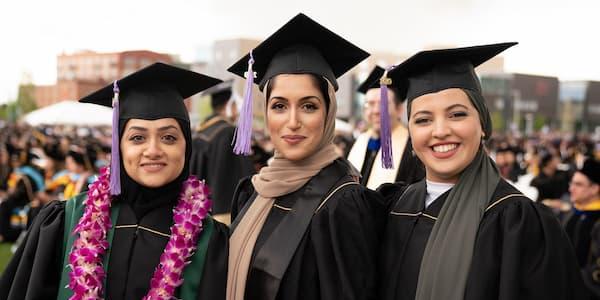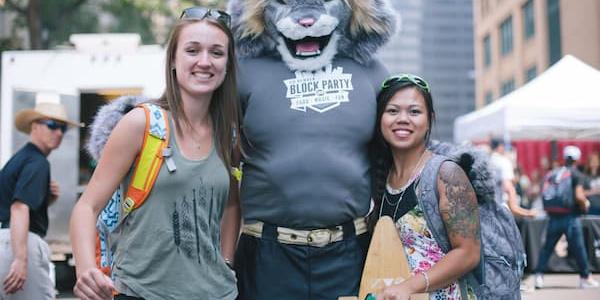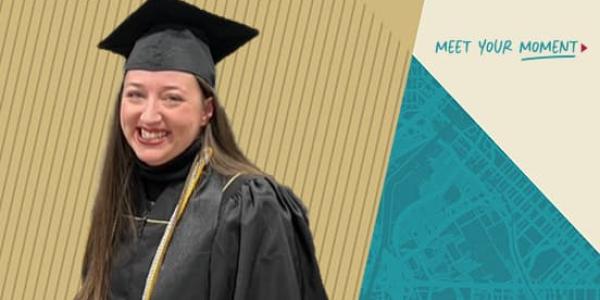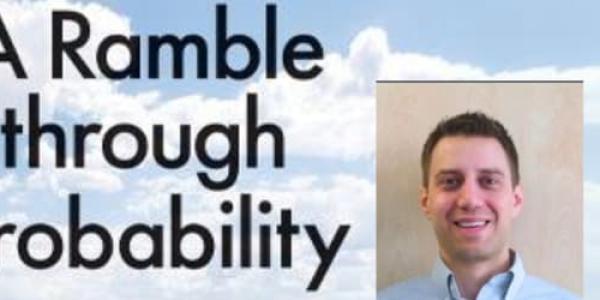Mathematics and statistics modeling that defines the world and improves our community.
Interested? Request more information
Credit hours: 120
Full-time, part-time
on-campus, hybrid and online courses
Start terms: fall, spring, summer
The Bachelor of Science in Mathematics offers foundational knowledge in both theoretical and applied mathematics and equips you with essential skills to build models, analyze data, and construct algorithms to help meet the demand for professionals who excel in solving problems and discovering patterns.
The honors program offers high-achieving students the opportunity to challenge themselves academically and graduate with one of three levels of honors.
The program offers optional concentration areas in applied mathematics, probability and statistics, or data science.
For example, the Bachelor of Science in Mathematics with a Probability and Statistics Option offers a solid foundation in both mathematical theory and practical applications, emphasizing probabilistic modeling and statistical methods.
The program equips you with the skills to analyze data, interpret findings, and develop models to solve real-world problems in diverse fields such as finance, engineering, genomics, and social sciences.
Math Clinic 4779
We offer mathematics clinics as three-credit courses for students designed as an educational mechanism for illustrating the applicability and utility of mathematics in many problem areas in private and public sectors.
The mathematics and statistics fields work together with many other disciplines, creating exciting opportunities to use your skills and provide insight for other fields and majors.
Discover a thriving and diverse community of approachable faculty and enthusiastic students offers many opportunities to get involved. Students can attend seminars, join the Math and Statistics Student Club, participate in undergraduate research projects, gain valuable work experience with an internship, help out other students by working in the Math and Stats Support Center (MASS) and outreach to local high schools, compete in international mathematical modeling contests, or just hang out with other students on the floor.
World-Class Research Faculty
Engage in cutting-edge research with internationally recognized scholars and faculty research opportunities with funding from NSF and other agencies.
Facilities
The department has its own floor in a modern building with plenty of specialized classroom and large, inviting study areas.
Opportunities
Start building your resume with internships, research projects, departmental honors, and/or service as an officer in one (or more) of our student clubs.
Alumni
The unique blend of analytical and quantitative skills served me as a distinguished foundation for a highly competitive and demanding job market for science and technology. I sincerely express my gratitude to CU Denver since it taught me what I know about Data Science and made me find a brilliant career path.
—Diane Gonzales Alvarez, 2021
Careers in mathematics and statical fields are numerous and lucrative. Graduates can look forward to working with other computational and data scientists within industry and government to shape the world around you.
Some Position Titles of Recent Undergraduates in Mathematics and Statistics
- Data Scientist
- Software Developer
- Operations Manager
- .NET Developer
- Software Systems Analyst
- Data Research Analyst
- Quantitative Analyst
- Statistician
- Cyber Security Analyst
- IT Project Manager
- Teacher or Professor
Companies
- National Renewable Energy Laboratory
- Comcast Corporation
- Ratheon Company
- Kaiser Permanente
- Google Inc.
- Frontier Airlines Inc.
- Cherry Creek School District
- Centurylink Inc.
- XCEL Energy Inc
- World Energy Partners LLC
- Multiple Universities
Majoring in Mathematical and Statistical Sciences: 42 hours
We offer both undergraduate and graduate curriculum facilitating intellectual growth of a diverse body of students at all levels. We prepare you to become integral members of the growing STEM workforce in Colorado, the U.S., and the world.
The broad curriculum in applied mathematics and statistics prepares you to thrive in a wide range of data science opportunities in industry and academia. Course topics include:
- Calculus
- Machine Learning
- Linear Algebra
- Statistical Analysis
- Modeling
- Data Analyst
- Computational Math
- Mathematical Proof Writing
- Programming
We are committed to creating a supportive culture that welcomes and celebrates all backgrounds, perspectives, and identities, and in which our diverse students, staff, and faculty are valued and respected.
Optional Concentrations
Applied Mathematics
Learn to apply mathematical concepts and tools to solve real world problems. In addition to your math courses you will add acceptable courses from a field of study—Business, Biology, Chemistry, Computer Science, Economics, Geography and Environmental Science, Health and Behavioral Science, Physics, or Sociology. See your advisor for details.
Data Science
By adding this option you add the fundamental training you need for the field of Data Science while allowing you to focus your data science training on applications related to Mathematics. Topics include:
- Programming for Data Science
- Fundamentals of Computing
Probability and Statistics
Specialze in probability and Statistics with this concentration which will aid you in accessing many career trajectories. Please your advisor for more information and requirements.
CU Denver Core: 34-40 Hours
You’ll be educated in
- English and mathematics
- International and cultural diversity perspectives
- Arts and humanities
- Behavioral, physical, and social sciences
Graduation Requirements: 15-26 Credit Hours
These courses give you a better understanding of the issues and skills you need to succeed.
Topics include:
- Logic, Language, and Scientific Reasoning
- Psychology
- Writing for the Sciences
- Public Health
Minor in Mathematics or Data Science
Non-Mathematics and Statistical Sciences majors can add a minor in Mathematics or Data Science to your degree by completing at least 21 credit hours for Mathematics or 18 credit hours for Data Science specified coursework. You will need to see your CLAS advisor to declare this minor.
Topics include:
- Calculus I-III
- Fundamentals of Computing
- Statistical Theory
- Probability and Statistics for Engineers
- Applied Regression Analysis
- Game Theory
- Econometrics
Double Majors
You, like many of our students, may be interested in a double major. Common combinations include:
- Economics
- Data Science
Certificates to Consider
We recommend these minors and certificates as excellent extensions of your Communications bachelor degree.
Applied Statistics Undergraduate Certificate
There is a growing need for qualified statistical analysts of the ever-increasing amounts of data collected in business, industry, and government. The Certificate in Applied Statistics program is designed to give students a strong background in statistical methodology and data analysis in preparation for opportunities in the workforce or for graduate studies.
Learn about the Applied Statistics certificate
Data Science Undergraduate Certificate
Data scientists will have essential competencies in several areas related to analysis of data. In particular, a data scientist should: have strong programming ability in a language popular in data science (e.g., Python, R, Julia); be able to extract, manipulate, and visualize data; have an understanding of probability and statistics in order to quantify uncertainty; be able to build complex models for finding patterns and explaining data. This certificate should provide students with essential skills for introductory data science.
Add a Masters in Applied Mathematics or Statistics to Your Bachelor's Degree in as Little as One Extra Year (4+1)
Save time and tuition while expanding your career opportunities at the same time by enrolling in the BA/BS + MA/MS in Applied Mathematics or Statistics program.
Benefits include
More career opportunities: Some career paths require that job candidates hold advanced degrees. Completing the BA/BS + MA/MS program allows you to apply for higher level positions more quickly, providing an advantage in a competitive job market
Saves time: Combining the Bachelors and Masters programs allow you to complete your undergraduate and graduate studies quickly, typically within five years instead of six or more.
Cost: A shorter timeline to (Applied Mathematics or Statistics) completion means less tuition, fees, and related educational expenses.
Teaching assistantships: The Department of Mathematical and Statistical Sciences may offer you, as a qualified MA student, research, or teaching assistantships. Combining the BA and MA degrees may allow you to access these opportunities.
Faculty: Combining the BA and MA degrees allows you to continue to take courses at the graduate level from the same familiar, award-winning, and caring faculty members.
Learning Outcomes for Mathematics
Knowledge Areas
Students must acquire both a conceptual and operational understanding of the following core areas of the undergraduate program:
- Differential and integral calculus in one and several variables
- Abstract mathematics as represented by basic logic, set theory and methods of proof
- Linear algebra
- One area of specialization (e.g., differential equations, discrete mathematics, statistics, optimization)
- One area of breadth outside of specialty (e.g., graph theory, probability, statistics, real analysis, geometry, history of mathematics, abstract algebra, computer science)
Skills
Students must acquire the following skills at an appropriate level:
- Precision and clarity in the oral and written communication of mathematical ideas
- Proficiency in the use of technology in mathematics
- Proficiency in the formulation and construction of proofs
- Facility in problem solving, modeling, approximation and mathematical exploration, both in groups and independently
- Appreciation of teamwork
- Attitudes. Through coursework and research, students are expected to cultivate the following attitudes and dispositions:
- Confidence in one's own mathematical skills and knowledge
- Desire for continuous and independent learning
- Appreciation for the dynamic role of mathematics in science, society and history
- Awareness of career opportunities in mathematics
- Awareness of the interrelations among areas of mathematics
Tuition
The cost of tuition is different for in-state and out-of-state students. See the link for the current table of rates.
Residents of Western Interstate Commission for Higher Education (WICHE) states may qualify for reduced tuition rates. The Western Undergraduate Exchange (WUE) program requires students to maintain current residency in WICHE state until degree completion.
Scholarships
Each year, CU Denver undergraduate students are awarded over $30 million in scholarships from institutional, local, state, and national sources. Learn more, and apply here.
Other Opportunities
The department and other departments have paid positions (both in the work-study program and outside of it) which may include jobs as graders, teaching assistants, and learning assistants. Please expect to have to apply. Learn more here.
Admission Requirements
If you are an incoming freshman to CU Denver (in-state, out-of-state, and international applicants), you can apply through either the Common Application or the Milo Application. Transfer students will need to submit the Milo Application.
Incoming first-year students
CU Denver requires that students complete the Colorado Higher Education Admission Requirements (HEAR). You will not have to meet all Minimum Academic Preparation Standards (MAPS) for admission, but you will need to complete CU Denver coursework by graduation.
Transfer Students
We have strong connections with other four-year and community colleges. If you have completed more than 24 credits of transferable coursework, you will be evaluated for admission on the basis of your college GPA without regard to your high school performance. If you have fewer than 24 credits, you will be evaluated based on both your high school and college GPAs. For more information and to plan your transfer, see transfer admissions in the admissions office.
If you are in your first or second semester at one of the participating Colorado community colleges and plan to transfer to CU Denver after earning your associate degree, CU Denver Bridge to Bachelors might be a great program for you. To qualify, you must meet the criteria including meeting regularly with your assigned CU transfer advisor while you are attending community college.
International Students
You will need to begin your application through the Office of International Affairs. They will help you manage your application process.
Application deadlines
Spring
Domestic Application: January 1
International Applications: Priority is September 15, and Final is October 15
Summer
Domestic Applications: May 15
International Applications: Priority is January 15, and Final is March 15
Fall
Domestic Applications: August 1
International Applications: Priority is March 15, and Final is May 15

Making Education Work for All
At CU Denver, making education work for all means breaking down barriers so every learner can succeed. Through inclusive policies, programs, and partnerships, we’re building a culture where opportunity isn’t defined by identity but by ambition and impact. Learn more at our Office of Access and Campus Engagement (ACE)

Find your people
Campus can feel like a huge place. We help you find your people by offering the experience of a more traditional, small liberal arts program—for a fraction of the cost. We offer a variety of clubs and networking opportunities.

The resources and education I needed to thrive
I spent more than a decade in the workforce between beginning my Bachelor’s degree at the University of Colorado Denver. When I originally attended college, I majored in English, so switching to math was a big left turn. Before my first semester, I worried about whether I could succeed in my courses or fit into the academic community as a non-traditional student. From my freshman-level Calculus courses to the final semester of my degree, the Math department gave me the resources and education I needed to succeed and thrive.
—Nikole Scribner Trout, 2022


